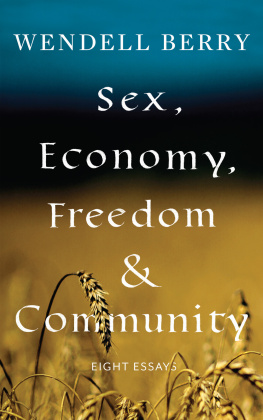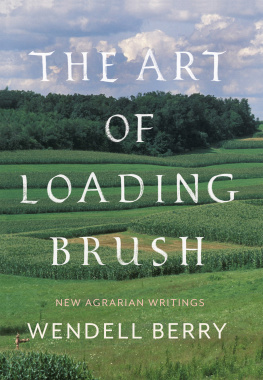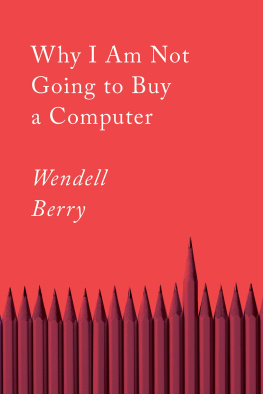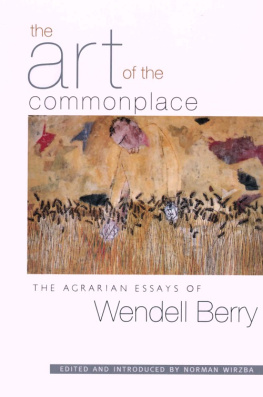Wendell Berry - Think Little
Here you can read online Wendell Berry - Think Little full text of the book (entire story) in english for free. Download pdf and epub, get meaning, cover and reviews about this ebook. year: 2019, publisher: Counterpoint, genre: Politics. Description of the work, (preface) as well as reviews are available. Best literature library LitArk.com created for fans of good reading and offers a wide selection of genres:
Romance novel
Science fiction
Adventure
Detective
Science
History
Home and family
Prose
Art
Politics
Computer
Non-fiction
Religion
Business
Children
Humor
Choose a favorite category and find really read worthwhile books. Enjoy immersion in the world of imagination, feel the emotions of the characters or learn something new for yourself, make an fascinating discovery.

- Book:Think Little
- Author:
- Publisher:Counterpoint
- Genre:
- Year:2019
- Rating:4 / 5
- Favourites:Add to favourites
- Your mark:
- 80
- 1
- 2
- 3
- 4
- 5
Think Little: summary, description and annotation
We offer to read an annotation, description, summary or preface (depends on what the author of the book "Think Little" wrote himself). If you haven't found the necessary information about the book — write in the comments, we will try to find it.
Think Little — read online for free the complete book (whole text) full work
Below is the text of the book, divided by pages. System saving the place of the last page read, allows you to conveniently read the book "Think Little" online for free, without having to search again every time where you left off. Put a bookmark, and you can go to the page where you finished reading at any time.
Font size:
Interval:
Bookmark:
Table of Contents
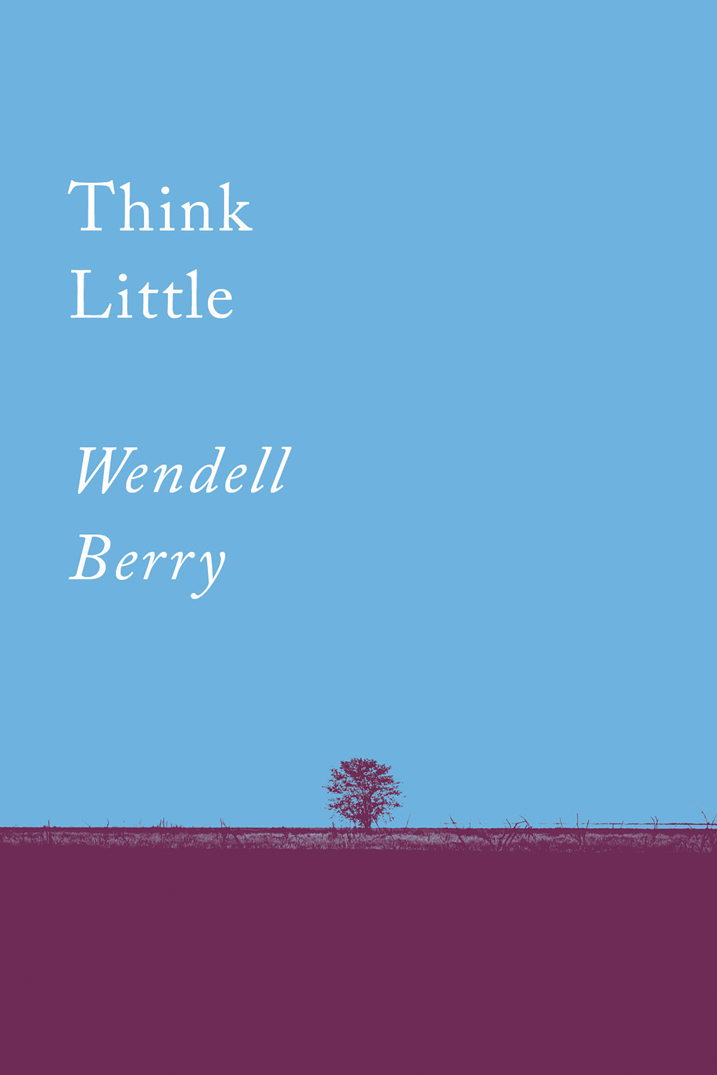
F irst there was Civil Rights, and then there was the War, and now it is the Environment. The first two of this sequence of causes have already risen to the top of the nations consciousness and declined somewhat in a remarkably short time. I mention this in order to begin with what I believe to be a justifiable skepticism. For it seems to me that the Civil Rights Movement and the Peace Movement, as popular causes in the electronic age, have partaken far too much of the nature of fads. Not for all, certainly, but for too many they have been the fashionable politics of the moment. As causes they have been undertaken too much in ignorance; they have been too much simplified; they have been powered too much by impatience and guilt of conscience and short-term enthusiasm, and too little by an authentic social vision and long-term conviction and deliberation. For most people those causes have remained almost entirely abstract; there has been too little personal involvement, and too much involvement in organizations that were insisting that other organizations should do what was right.
There is considerable danger that the Environmental Movement will have the same nature: that it will be a public cause, served by organizations that will self-righteously criticize and condemn other organizations, inflated for a while by a lot of public talk in the media, only to be replaced in its turn by another fashionable crisis. I hope that will not happen, and I believe that there are ways to keep it from happening, but I know that if this effort is carried on solely as a public cause, if millions of people cannot or will not undertake it as a private cause as well, then it is sure to happen. In five years the energy of our present concern will have petered out in a series of public gestures and no doubt in a series of empty laws and a great, and perhaps the last, human opportunity will have been lost.
It need not be that way. A better possibility is that the movement to preserve the environment will be seen to be, as I think it has to be, not a digression from the civil rights and peace movements, but the logical culmination of those movements. For I believe that the separation of these three problems is artificial. They have the same cause, and that is the mentality of greed and exploitation. The mentality that exploits and destroys the natural environment is the same that abuses racial and economic minorities, that imposes on young men the tyranny of the military draft, that makes war against peasants and women and children with the indifference of technology. The mentality that destroys a watershed and then panics at the threat of flood is the same mentality that gives institutionalized insult to black people and then panics at the prospect of race riots. It is the same mentality that can mount deliberate warfare against a civilian population and then express moral shock at the logical consequence of such warfare at My Lai. We would be fools to believe that we could solve any one of these problems without solving the others.
To me, one of the most important aspects of the Environmental Movement is that it brings us not just to another public crisis, but to a crisis of the protest movement itself. For the environmental crisis should make it dramatically clear, as perhaps it has not always been before, that there is no public crisis that is not also private. To most advocates of civil rights, racism has seemed mostly the fault of someone else. For most advocates of peace, the war has been a remote reality, and the burden of the blame has seemed to rest mostly on the government. I am certain that these crises have been more private, and that we have each suffered more from them and been more responsible for them, than has been readily apparent, but the connections have been difficult to see. Racism and militarism have been institutionalized among us for too long for our personal involvement in those evils to be easily apparent to us. Think, for example, of all the Northerners who assumed until black people attempted to move into their neighborhoods that racism was a Southern phenomenon. And think how quickly one might almost say how naturally among some of its members the Peace Movement has spawned policies of deliberate provocation and violence.
BUT THE ENVIRONMENTAL crisis rises closer to home. Every time we draw a breath, every time we drink a glass of water, we are suffering from it. And more important, every time we indulge in, or depend on, the wastefulness of our economy and our economys first principle is waste we are causing the crisis. Nearly every one of us, nearly every day of his life, is contributing directly to the ruin of this planet. A protest meeting on the issue of environmental abuse is not a convocation of accusers, it is a convocation of the guilty. That realization ought to clear the smog of self-righteousness that has almost conventionally hovered over these occasions and let us see the work that is to be done.
In this crisis it is certain that every one of us has a public responsibility. We must not cease to bother the government and the other institutions to see that they never become comfortable with easy promises. For myself, I want to say that I hope never again to go to Frankfort to present a petition to the governor on an issue so vital as that of strip mining, only to be dealt with by some ignorant functionary as several of us were not so long ago, the governor himself being too busy to receive us. Next time I will go prepared to wait as long as necessary to see that the petitioners complaints and their arguments are heard fully and by the governor. And then I will hope to find ways to keep those complaints and arguments from being forgotten until something is done to relieve them. The time is past when it was enough merely to elect our officials. We will have to elect them and then go and watch them and keep our hands on them, the way the coal companies do. We have made a tradition in Kentucky of putting self-servers, and worse, in charge of our vital interests. I am sick of it. And I think that one way to change it is to make Frankfort a less comfortable place. I believe in American political principles, and I will not sit idly by and see those principles destroyed by sorry practice. I am ashamed that American government should have become the chief cause of disillusionment with American principles.
And so when the government in Frankfort again proves too stupid or too blind or too corrupt to see the plain truth and to act with simple decency, I intend to be there, and I trust that I wont be alone. I hope, moreover, to be there, not with a sign or a slogan or a button, but with the facts and the arguments. A crowd whose discontent has risen no higher than the level of slogans is only a crowd. But a crowd that understands the reasons for its discontent and knows the remedies is a vital community, and it will have to be reckoned with. I would rather go before the government with two men who have a competent understanding of an issue, and who therefore deserve a hearing, than with two thousand who are vaguely dissatisfied.
But even the most articulate public protest is not enough. We dont live in the government or in institutions or in our public utterances and acts, and the environmental crisis has its roots in our lives. By the same token, environmental health will also be rooted in our lives. That is, I take it, simply a fact, and in the light of it we can see how superficial and foolish we would be to think that we could correct what is wrong merely by tinkering with the institutional machinery. The changes that are required are fundamental changes in the way we are living.
Next pageFont size:
Interval:
Bookmark:
Similar books «Think Little»
Look at similar books to Think Little. We have selected literature similar in name and meaning in the hope of providing readers with more options to find new, interesting, not yet read works.
Discussion, reviews of the book Think Little and just readers' own opinions. Leave your comments, write what you think about the work, its meaning or the main characters. Specify what exactly you liked and what you didn't like, and why you think so.






